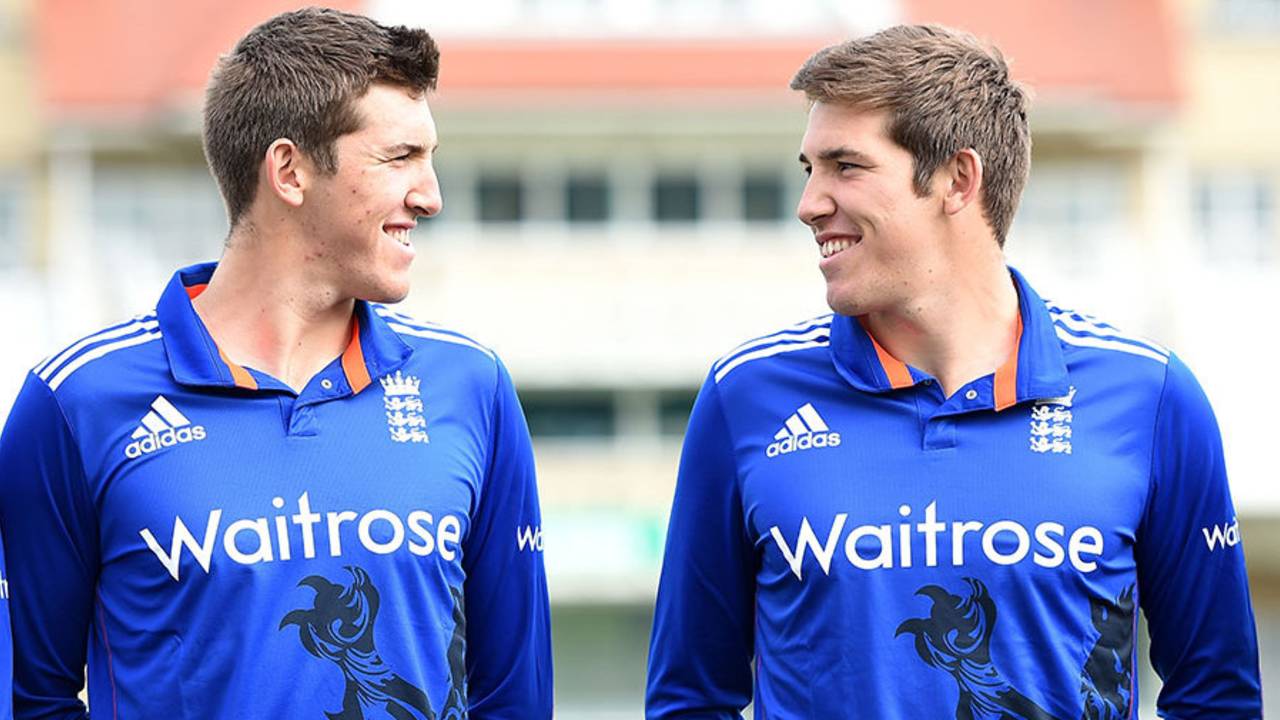You have to go back a long time to find England selections based on potential - rather than achievement - quite as much as the Overton twins.
Perhaps
Ben Hollioake, who had played only five first-class games when he was drafted into England's ODI squad in 1997, might be a more obvious example. Or maybe Derek Pringle, who was still at Cambridge University when he was called up for the 1982 Test series against India. Or it could be we have to go all the way back to 1935 when
David Townsend - who remains the last man to play Test cricket for England without ever representing a county - was selected to tour West Indies on the back of his form for Oxford University, or 1945 when
John Dewes made his first-class debut in the Victory Test against Australia.
The Overtons are, by comparison, veterans of county cricket. And both are, for different reasons, outstanding prospects. But neither are currently certain of their place in the Somerset side - Craig has not played a first team white-ball game this season, while Jamie was left out of the current round of Championship matches - and neither would claim to be anything like the finished article.
Craig looks the more mature of the two in terms of cricketing development. While his pace, at international level, might be a fraction sedate, he seems to possess the skills and the composure to suggest he could, in time, be an allrounder in the Stuart Broad mould. But he has not been selected by Somerset in white ball cricket this season partially as it was feared that his natural length - what would traditionally be described as a "good" length - might be punished in the modern game. And if it is feared what county batsmen might do to him, the prospect of this ultra-aggressive New Zealand side taking him on must be chilling. Nobody wants to endanger his long-term development.
But the selection of the Overtons illustrates the long-term planning of the England management. Theirs is not a selection based upon winning this series - it may well be that neither feature in the remaining two matches - it is upon identifying players who can help win the 2019 World Cup. In that context, their selection makes far more sense. But it was noticeable at Trent Bridge, as England trained ahead of the fourth ODI, that the pick of the bowlers on show was
Luke Fletcher, the 26-year-old with a physique that contains few sharp edges, was one of several county bowers called to the net session - Andy Carter, Jack Brooks and Reece Topley were the others - to help England prepare.
Fletcher responded by not only hitting
Ben Stokes on the left arm with an excellent short ball - Stokes was said to be fine after applying ice to the bruise - but consistently delivered perfect yorkers. He is not quick, he is not glamorous and he will rarely be mistaken for a stag in the field, but if England are looking for a man to bowl at the death, they will be hard-pressed to do better.
Yet his face - and perhaps his shirt - does not fit. Such is England's desire to play "aggressive" cricket - a laudable desire in many ways - that there is a danger that just a little subtly has been lost from their game. Nobody wants them to revert to the timid team seen at the World Cup but, just as their failure to bat out their 50 overs in Southampton was unnecessarily testosterone-fuelled, there will be times when the prosaic skills - the ability to hit a yorker length even at medium pace - are more useful than all the pace, athleticism, height or variation that more eye-catching cricketers might deliver. The all-out desire for aggression - a desire that seems to fear reason in case it spreads negativity like a virus - might be in danger of obscuring just a little of the value of wisdom.
It was a point indirectly made by
Dimitri Mascarenhas, the former England seamer, who now works as New Zealand's bowling coach. He suggested it was unwise to pick players on the basis of potential and instead argued for skill-based selection.
Asked about the selection of left-arm seamers in limited-overs cricket, he agreed that it was an attractive option but insisted it could only be justified if they had the requisite skills. "I wouldn't say it's essential," he said. "You definitely wouldn't select one for the sake of it. There's no point just picking a left-armer for variation. You pick your best four or five bowlers for each game. If a left-armer is one of them then that's brilliant. And yorkers remain a massive part of the game."
Perhaps such criticism is churlish. This has been a wonderfully entertaining series between two attractive sides and England's limited-overs side - containing some of the most attractive cricketers they have produced in many years - is, at last, heading in the right direction. Indeed, such has been their improvement that it is hard not to reflect on the World Cup and wonder what might have been.
The New Zealand coach, Mike Hesson, summed it up best. "This England team is very aggressive, especially with the bat," he said. "They have hitters from one to 10. They don't allow you to settle and that puts a lot of pressure on our bowlers. Since the World Cup they're a completely different team. If this side were at the World Cup, I think they'd certainly scare a few teams.
"They haven't nailed it quite yet - you're never going to straightaway - but on their day, crikey, they're dangerous."
But to progress from dangerous to deadly England may need to add just a little more brain to their brawn.
George Dobell is a senior correspondent at ESPNcricinfo
